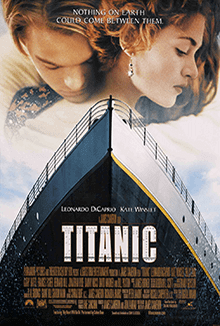
Titanic
Titanic is a 1997 American epic romantic disaster film directed, written, co-produced, and co-edited by James Cameron. Incorporating both historical and fictionalized aspects, it is based on accounts of the sinking of RMS Titanic in 1912. Leonardo DiCaprio and Kate Winslet star as members of different social classes who fall in love during the ship's maiden voyage. The film also features an ensemble cast of Billy Zane, Kathy Bates, Frances Fisher, Bernard Hill, Jonathan Hyde, Danny Nucci, David Warner and Bill Paxton. Cameron's inspiration for the film came from his fascination with shipwrecks. He felt a love story interspersed with the human loss would be essential to convey the emotional impact of the disaster. Production began on September 1, 1995, when Cameron shot footage of the Titanic wreck. The modern scenes on the research vessel were shot on board the Akademik Mstislav Keldysh, which Cameron had used as a base when filming the wreck. Scale models, computer-generated imagery and a reconstruction of the Titanic built at Baja Studios were used to recreate the sinking. The film was co-financed by Paramount Pictures and 20th Century Fox; Paramount handled distribution in the United States and Canada while 20th Century Fox released the film internationally. Titanic was the most expensive film ever made at the time, with a production budget of $200 million. Filming took place from July 1996 to March 1997. Titanic was released on December 19, 1997. It was praised for its visual effects, performances (particularly those of DiCaprio, Winslet, and Stuart), production values, direction, score, cinematography, story and emotional depth. Among other awards, it was nominated for 14 Academy Awards and won 11, including Best Picture and Best Director, tying Ben-Hur (1959) for the most Academy Awards won by a film. With an initial worldwide gross of over $1.84 billion, Titanic was the first film to reach the billion-dollar mark. It was the highest-grossing film of all time until Cameron's next film, Avatar (2009), surpassed it in 2010. Income from the initial theatrical release, retail video and soundtrack sales and US broadcast rights exceeded $3.2 billion. A number of re-releases have pushed the film's worldwide theatrical total to $2.264 billion, making it the second film to gross more than $2 billion worldwide after Avatar. In 2017, the Library of Congress selected it for preservation in the United States National Film Registry for being "culturally, historically, or aesthetically significant".
Okay, here we go. She hits the berg on the starboard side, right? She kind of bumps along... punching holes like morse code... ditdit-dit... along the side... below the water line. Then the forward compartments start to flood. Now, as the water level rises... it spills over the watertight bulkheads... which, unfortunately, don't go any higher than E deck. So now as the bow goes down... the stern rises up, slow at first... then faster and faster... until finally, she's got her whole ass sticking up in the air. And that's a big ass. We're talking 20, 30,000 tons. Okay? And the hull's not designed to deal with that pressure. So, what happens? She splits, right down to the keel. And the stern... falls back level. Then... as the bow sinks... it pulls the stern vertical... and then finally detaches. Now the stern section just kind of bobs there like a cork for a couple of minutes... floods, and finally goes under about 2:20 AM... 2 hours and 40 minutes after the collision. The bow section planes away... landing about a half a mile away... going 20, 30 knots when it hits the ocean floor. Pretty cool? Thank you for that fine forensic analysis, Mr. Bodine. Of course, the experience of it was... somewhat different.
Titanic
